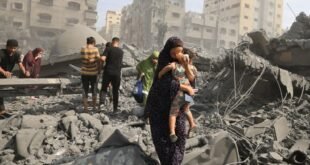05-02-2022
DUBAI/ BAGHDAD: The drone attack by a little-known armed group in Iraq on the United Arab Emirates (UAE) this week has raised questions about Baghdad’s involvement in regional tensions between Iran-backed Houthi rebels in Yemen and the Saudi-led coalition.
Alwiyat al-Waad al-Haq (AWH), or the True Promise Brigades, claimed responsibility for the strike on the UAE on Wednesday, saying in a statement it launched “four drones targeting vital facilities in Abu Dhabi” in retaliation for the Emirates’ policies in Iraq and Yemen.
 Several analysts linked the strikes to a shadowy militia Kataib Hezbollah (KH), a powerful Iran-backed Shia armed group in Iraq that has been listed by the United States as a “terrorist organization”.
Several analysts linked the strikes to a shadowy militia Kataib Hezbollah (KH), a powerful Iran-backed Shia armed group in Iraq that has been listed by the United States as a “terrorist organization”.
The incident brought to light that the UAE was now being targeted from its north and south, after three recent attacks launched by Houthi rebels in Yemen.
Following the drone strikes, Iraqi Shia leader Muqtada al-Sadr condemned the attack in a statement, saying some “terrorist outlaws” have dragged Iraq into a “dangerous regional war” by targeting a Gulf state.
Although al-Sadr called for an end to the war in Yemen and the normalization of ties with Israel, he denounced violence as a means to these ends.
An Iraqi springboard?
While the attack from Iraq was a significant development, analysts said it did not indicate that Baghdad was being pulled deeper into regional tensions between Iran, which is aligned with Yemen’s Houthis and Saudi Arabia, which has fought with the UAE in Yemen since 2015 against the rebels.
 “Iraq has already been involved in this conflict, with the Hashd (paramilitary factions) and associated Shia jihadist groups having close ties to the Houthis,” said Talha Abdulrazaq, an Iraq expert and researcher at the University of Exeter’s Strategy and Security Institute.
“Iraq has already been involved in this conflict, with the Hashd (paramilitary factions) and associated Shia jihadist groups having close ties to the Houthis,” said Talha Abdulrazaq, an Iraq expert and researcher at the University of Exeter’s Strategy and Security Institute.
“Previous strikes against Saudi official complexes and oil facilities have been launched from Iraqi territory,” he added.
Before Wednesday’s incident, Alwiyat al-Waad al-Haq claimed a drone attack targeting the Yamama Palace in the Saudi capital, Riyadh, in January 2021, saying it was retaliation for a suicide bombing claimed by the ISIL (ISIS) group in a Baghdad shopping district two days earlier.
Lahib Higel, a senior Iraq analyst at the International Crisis Group, said Iraq is “already part of Saudi-Iran tensions and will forever be a part of them as long as they exist”.
“The attack does not necessarily mean that Iraq will be dragged further, but it’s a strong indication that the divide in Iraq (between pro-Iran and pro-Saudi factions) … even within the so-called Shia house will continue,” said Higel.
 The rivalry between US ally Saudi Arabia and Iran, which is on an opposing side to Riyadh and Washington in multiple Middle East conflicts, has long played out in Iraq.
The rivalry between US ally Saudi Arabia and Iran, which is on an opposing side to Riyadh and Washington in multiple Middle East conflicts, has long played out in Iraq.
While some Iraqi groups, including the current government, pivot towards Riyadh, many powerful Shia paramilitary groups and resistance factions, including Kataib Hezbollah, support Tehran. Also, as home to powerful Iranian-backed militias, Iraq has been used as a battleground between Iran and the US.
In January 2020, a US drone strike killed Iran’s revered general Qassem Soleimani and Iraqi militia commander Abu Mahdi al-Muhandis, pushing Washington and Tehran to the brink of war. Iran and affiliated Iraqi militias have since targeted several US diplomatic sites and military bases where US troops were stationed.
‘Message from Iran’
Higel said the attack was, therefore, a two-pronged message from Iran that “it can strike from different places, and not just Yemen [and] it does not approve of the recent visit by the Israeli president to the UAE”, or more broadly normalization between Israel and several Arab states. (Int’l News Desk)
 Pressmediaofindia
Pressmediaofindia




